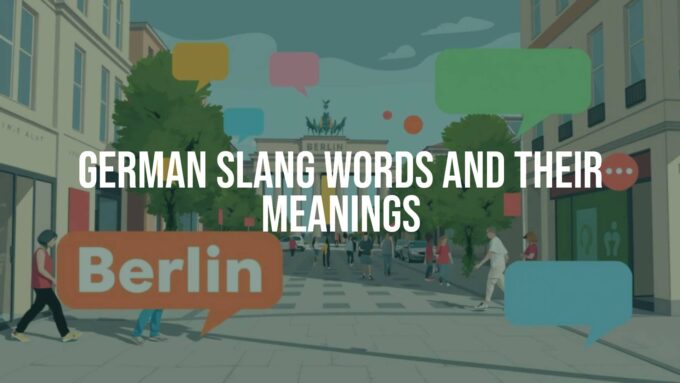Learning German as an English speaker may seem easy at first because many words look and sound similar. However, sometimes these similarities can be misleading. German false friends in English are words that look or sound alike in both languages but actually mean very different things. These tricky words can cause funny, confusing, or awkward misunderstandings. While English and German share many true cognates because of their common roots-like “der Frosch” (frog) or “das Wasser” (water)-they also have these confusing false friends. Recognizing and understanding them is an important step for anyone aiming to communicate clearly in German.
What Are German False Friends in English?
Definition and Origins of False Friends
In language study, “false friends,” also known as “false cognates,” are pairs of words in two languages that look or sound very similar, but mean something different. For example, the English word “pain” means something quite different from the French “le pain,” which is actually “bread.” The reason for these mix-ups is that languages often develop from the same historical roots, but the meanings of certain words change over time or with borrowing from other languages. So, although many English and German words help learners because they are true cognates, some have changed meaning and can trick people who are still learning.
The close relationship between English and German-both being West Germanic languages-means there are many words that look nearly the same in both languages. However, not all of them share the same meaning. Some words borrowed from other languages (like French and Latin) have also changed meaning in English or German, making things even trickier.

How Do German False Friends Happen?
German-English false friends usually happen in a few simple ways. Sometimes, a word from their shared history kept its meaning in one language but changed it in the other. For example, the German “der Herd” means a ‘stove,’ but in English, “herd” means a group of animals. Both words once meant something similar, but their meanings split over time. Borrowed words from other languages add to the confusion. The German “Chef” (meaning ‘boss’) comes from French, and in English, “chef” is only a ‘cook.’ Germans even make up their own “English-sounding” words, like “das Handy” for a mobile phone, which has no meaning in English. These borrowed or invented words sound familiar but are easy to misunderstand.
Why Do German False Friends Cause Confusion?
German false friends confuse learners because they seem familiar at first glance. People naturally assume that similar-looking or similar-sounding words have the same meaning. This shortcut works with true cognates but backfires with false friends. The mistake can be funny (“gift” in German is ‘poison,’ not a present!) or embarrassing. Sometimes, false friends do have a small overlap in meaning, making the difference harder to spot. For example, “aktuell” in German means ‘current’ or ‘up-to-date,’ but in English, “actually” means ‘really’ or ‘in fact.’ So it is easy to mix them up unless you carefully check each word in its real context.

Types of German-English False Friends
Words with Similar Spellings but Different Meanings
Some of the trickiest false friends are words that look nearly the same. For example, “die Wand” in German looks just like “wand” in English, but it means ‘wall,’ not a magic stick. “Fast” in German means ‘almost,’ but in English, it means ‘quick.’ “Bald” in German means ‘soon,’ not ‘hairless.’ Another example: “der Rat” is ‘advice’ or ‘council’ in German, but a “rat” in English is a rodent. Looking at spelling alone can lead to mistakes with these words.
Identical or Nearly Identical Words with Different Uses
Sometimes German and English words are spelled or pronounced the same, but have completely different meanings. The German “das Gift” is ‘poison,’ while “gift” in English is a present. “Der Chef” in German means ‘boss,’ not a cooking professional. The German “das Gymnasium” is a type of academic high school, while in English, “gymnasium” or “gym” is a place for exercise. These words are especially risky because their close match makes it easy to mix them up.
Words with Shared Roots, Different Meanings
Many false friends come from the same original word, but their meanings split over time. For example, “bekommen” in German means ‘to get’ or ‘receive,’ not ‘to become.’ The German word for ‘to become’ is “werden.” Another example is “sensibel” in German, which means ‘sensitive,’ while the English “sensible” means ‘reasonable’ or ‘practical.’ These small but important differences can lead learners to say the wrong thing without realizing it.
False Friends in Everyday Language
Some of the most common false friends are short, basic words used every day. For instance, “weil” in German means ‘because,’ not ‘while.’ The German “wer” means ‘who,’ not ‘where’ (that’s “wo” in German). Or “aktuell” in German means ‘current,’ and “also” in German means ‘so’ or ‘therefore.’ These basic words are used often, so it’s easy for beginners to get confused if they don’t learn the right meaning early on.
Examples of German False Friends in English
Popular German-English False Friends and What They Really Mean
Here are some well-known examples of German false friends that often cause confusion:
| German Word | What German Word Means | English Word That Looks the Same | What English Word Means |
|---|---|---|---|
| das Gift | poison | gift | present |
| bekommen | to get, to receive | to become | werden (in German) |
| das Handy | mobile/cell phone | handy | useful, convenient |
| der Chef | boss/manager | chef | cook |
| das Gymnasium | high school | gymnasium | gym (exercise place) |
German False Friends in School, Work, and Social Life
False friends can appear in many settings and cause confusion. In school, “das Gymnasium” refers to an academic high school, not a gym. “Die Hochschule” means college or university, not high school. At work, “der Chef” is your boss, not a cook. “Die Fabrik” is a factory, not fabric. In social life, “sympathisch” means ‘friendly’ or ‘nice,’ not ‘sympathetic’ (which is “mitfühlend”). Knowing the real meaning is important to avoid misunderstanding others or using the wrong word.

Idioms and Expressions with False Friends
False friends can hide in idioms too. For example, “der Mist” in German means ‘rubbish’ or ‘dung’ and is used to show frustration-very different from the English “mist” (a type of fog). Another example: “der Fall” in German means a ‘case’ (like a legal case), while “fall” in English means ‘a drop’ or the season ‘autumn.’ Literal translations of these phrases don’t work, so it’s important to learn the meanings in full expressions.
How German False Friends Affect Learners
Common Mistakes English and German Learners Make
False friends are a common source of errors. For example, an English speaker saying “Ich möchte Arzt bekommen” (literally, “I want to get a doctor”) instead of “Ich möchte Arzt werden” (“I want to become a doctor”). German speakers learning English may use “become” for “get” or “receive.” Words like “Gift” in German (meaning poison) could cause panic if used when someone means “present.” “Sympathisch” in German should be ‘likeable,’ but is often mistaken for ‘sympathetic.’
Problems in Speaking and Writing
These mistakes make communication harder. In conversation, a false friend can confuse listeners and stop smooth discussion. For example, saying “Ich bin kurios” (I am strange) instead of “Ich bin neugierig” (I am curious) changes the whole meaning. In writing, mistakes are even more obvious and hard to hide. Misusing words like “der Mist” (rubbish) when meaning “mist” can make text confusing or sound silly. Getting these right makes you sound more fluent and avoids confusion.
Real-Life Examples of Misunderstandings
There are many real life stories about German-English false friends. An American director once used “kurios” (strange) instead of “neugierig” (curious), sounding weird instead of interested. Offering a German “Gift” as a present got a shocked reaction, as “Gift” means poison. Asking for “Hose” in a shop (expecting a water hose) will get you trousers instead. These stories show why paying attention to false friends is so important.
How to Avoid Mistakes with German-English False Friends
Knowing About False Friends
The first step to avoid mistakes is simply knowing that false friends exist. Whenever you see a familiar word, stop and check its meaning before using it. Don’t take anything for granted, especially if you’re just starting to learn.
Tips for Remembering True Meanings
- Link words to a funny picture or story to remember the difference. For example, for “das Gift” (poison), imagine a present box with a skull on it.
- Learn words in real sentences, not on their own (“Ich bekomme einen Kaffee” for “I am getting a coffee”).
- Practice saying the German word with a German accent to avoid mixing it up with the English word.

Use Context and Check with a Dictionary
If you’re not sure, use clues from the rest of the sentence, or look the word up in a good dictionary. Often, context will help you tell if the word means what you think, but when in doubt, double-checking is the best way to be sure.
Practice False Friends Regularly
- Make flashcards: put the German false friend and its real meaning on one side, and the English lookalike and its meaning on the other.
- Take quizzes or write your own sentences using false friends correctly.
- Talk with native speakers and ask them to correct you if you make a mistake.
Useful Tools and Resources
- Look at online lists of common false friends (many universities and language websites have these).
- Use language apps and platforms with real-life examples.
- Watch German TV shows or films with subtitles to see how words are used in practice.
- Always keep a good German-English dictionary handy.
Why Learning German False Friends Helps
Clearer Communication
Knowing false friends helps you avoid mistakes and say exactly what you mean. You’ll sound more confident and people will understand you better. This avoids confusion and makes both conversations and writing smoother.
Better Exam Results
If you plan to take German language exams, knowing false friends can make a big difference because they’re often tested. Spotting tricky words quickly can get you higher scores in vocabulary, reading, listening, and speaking sections.
Understanding the Culture
Learning these words also helps you see how German and English have developed in their own ways. You’ll understand conversations better, avoid misunderstandings, and respect how the language really works in context.
Frequently Asked Questions about German-English False Friends
Are All German False Friends Completely Wrong?
No, not all of them are total opposites. Some have a bit of overlap, but are used differently, like “aktuell” (current) and “actually” (really). Either way, it’s safest to check each word so you don’t slip up.
Do Other Languages Have False Friends Too?
Yes! False friends exist in most languages, especially when they have similar roots or borrow words from one another. For instance, in French, “librairie” is a bookstore, not a library (“bibliothèque”). In Spanish, “burro” is donkey, but in Italian, “burro” means butter. This isn’t only a German-English issue.
What’s the Difference Between a False Friend and a Cognate?
Cognates are words that look similar and mean the same thing (like “Haus” and “house”). False friends look or sound the same but have different meanings (“Gift” is poison, not a present). Always check if the meaning is really what you expect before using it.













Leave a comment